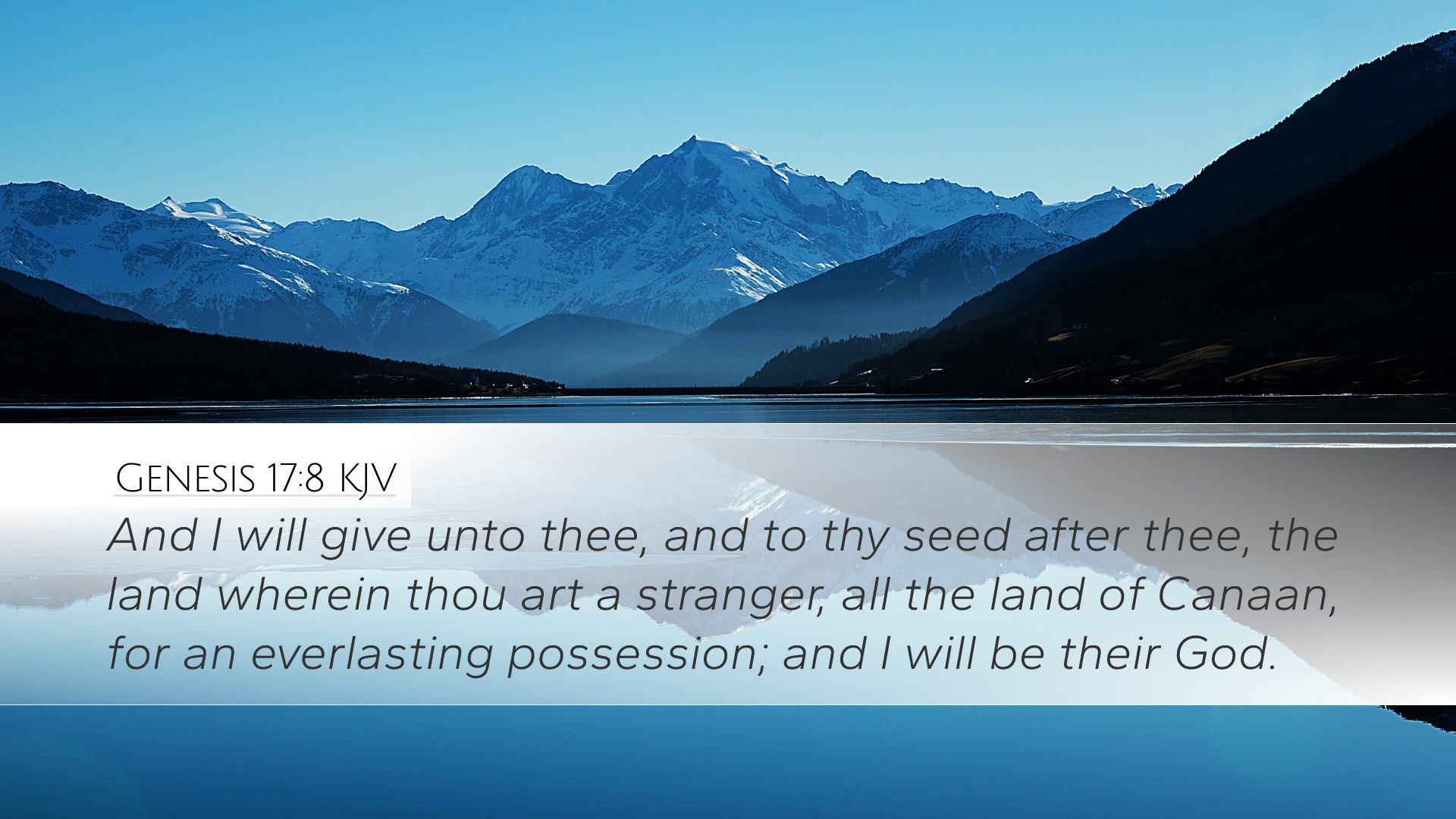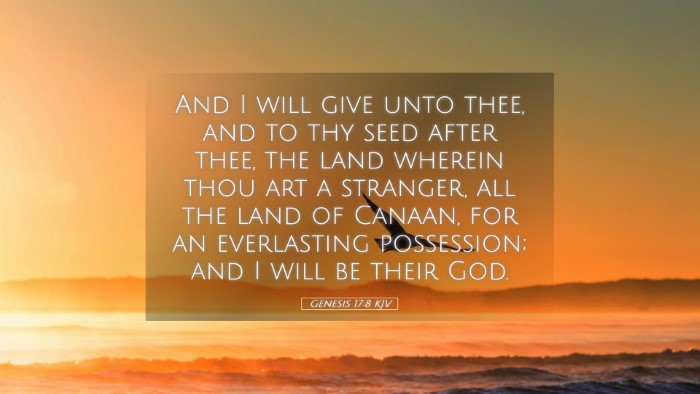Commentary on Genesis 17:8
Verse: Genesis 17:8
“And I will give unto thee, and to thy seed after thee, the land wherein thou art a stranger, all the land of Canaan, for an everlasting possession; and I will be their God.”
Introduction
This verse is a significant milestone in God's covenant with Abram (later named Abraham). It encapsulates the divine promise of the land of Canaan to Abram and his descendants, which becomes a focal point of the biblical narrative. The implications of this promise extend beyond geographical lineage; they delve into themes of faith, identity, and divine assurance.
Historical Context
Genesis 17 is part of a larger narrative concerning the covenant God establishes with Abraham. This covenant not only includes promises of land but also of numerous descendants and blessings. At the time, Abram was 99 years old and had already experienced the challenges of waiting for a promised heir (Genesis 15:4). The mention of "the land wherein thou art a stranger" signifies that Canaan was a foreign land to Abram, yet it would become the cradle of God’s chosen people.
Theological Insights
- Covenant and Land: The promise of land is critical in understanding God's relationship with Israel. Matthew Henry notes that God's covenants often include a physical land component, reflecting His desire to dwell among His people.
- Everlasting Possession: The phrase "everlasting possession" indicates the permanence of the divine promise. According to Adam Clarke, this is not merely a temporal promise but touches upon the eternal aspect of God’s faithfulness to His people.
- God as their God: The assurance "I will be their God" signifies a relationship filled with mutual commitment. Albert Barnes highlights that this declaration is not just about ownership but a call into a deeper communion with the divine.
Commentary from Biblical Scholars
Matthew Henry
Matthew Henry emphasizes the grace of God in selecting Abram as the recipient of such a coveted promise. He stresses that this selection was based on God's mercy rather than on any merit of Abraham. This highlights a theological underpinning that God's grace is sovereign and unconditional. Henry also notes the importance of the condition for the promise, invoking the need for Abram and his descendants to maintain faith and obedience to God.
Albert Barnes
Albert Barnes comments on the historical ramifications of this promise, indicating that it established the territory that would be central to the Israelite identity. He reflects on the significance of Canaan not solely as a physical land but as a symbol of God’s provision and promise of rest. Barnes articulates that this promise is fulfilled in stages, laying the groundwork for future generations of Israelites who would eventually inhabit this land.
Adam Clarke
Adam Clarke provides an analysis of the etymology and significance of the term "Canaan," associating it with “a lowland” as indicative of God's salvation reaching the humble. He further remarks on the implications of “stranger” which suggests both the temporary status of Abram and the idea that believers are also strangers on earth, awaiting a heavenly homeland. Clarke encourages the reader to view this promise, and indeed the entirety of Scripture, through the lens of Christian hope and renewal.
Application for Modern Readers
The implications of Genesis 17:8 resonate deeply with contemporary faith practices. Pastors and theologians may extract from this passage the foundational truths of God's promises, encouraging congregations to recognize their identity rooted in the assurance that God is with them, much like Abram.
Additionally, for students of theology, the balance of God's sovereignty and human responsibility stands out. While Abram's faith and obedience were conditions for experiencing God's promises, the ultimate fulfillment rests upon God's unwavering character and faithfulness.
In a practical sense, this passage beckons believers to examine their own relationships with God's promises. The call to view themselves as "strangers" in this world challenges the pursuits and priorities of life, urging a focus on eternal rather than temporary possessions.
Conclusion
Genesis 17:8 serves as a rich tapestry of theological themes and practical insights. It encapsulates the beginning of a unique relationship between God and Abram's descendants. Through the lens of historical theology as noted by scholars like Henry, Barnes, and Clarke, readers can both appreciate the grandeur of God's promise and engage personally with this foundational narrative in their faith journey.


